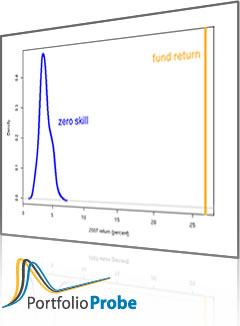Follow us using:
Newsletter Sign-up
Author Archives: Pat
Diverse US portfolios did well in 2011
Constraining the maximum asset-portfolio correlation gave bigger returns and smaller volatility. Previously “Portfolio diversity” introduced the topic of asset-portfolio correlations. It also generated four sets of long-only random portfolios as of the start of 2011 using constituents of the S&P 500: exactly 20 names, weights between 1% and 10% exactly 20 names, maximum asset-portfolio correlation … Continue reading
Posted in Quant finance
Tagged asset-portfolio correlation, diversification, portfolio diversity, S&P 500
Leave a comment
Portfolio diversity
How many baskets are your eggs in? Meucci diversity Attilio Meucci directly addresses the adage: Don’t put all your eggs in one basket. His idea is to think of your portfolio as a set of subportfolios that are each uncorrelated with the rest. If your portfolio can be configured to have a lot of roughly … Continue reading
Posted in Quant finance, R language
Tagged asset-portfolio correlation, diversification, portfolio diversity, S&P 500
4 Comments
US market portrait 2012 week 19
US large cap market returns. Fine print The data are from Yahoo Almost all of the S&P 500 stocks are used The initial post was “Replacing market indices” The R code is in marketportrait_funs.R Subscribe to the Portfolio Probe blog by Email
Motivating retirement savings
You can win money by saying how to get people to treat themselves better. InnoCentive has a challenge: How do we best get people to understand how important it is to plan for, and take specific action steps today, to create a steady and reliable stream of income for their retirement years? What would be … Continue reading
Posted in Fund management in general
Leave a comment
Cross-sectional skewness and kurtosis: stocks and portfolios
Not quite expected behavior of skewness and kurtosis. The question In each time period the returns of a universe of stocks will have some distribution — distributions as displayed in “Replacing market indices” and Figure 1. Figure 1: A cross-sectional distribution of simple returns of stocks. In particular they will have values for skewness and … Continue reading
US market portrait 2012 week 18
US large cap market returns. Fine print The data are from Yahoo Almost all of the S&P 500 stocks are used The initial post was “Replacing market indices” The R code is in marketportrait_funs.R Subscribe to the Portfolio Probe blog by Email
A variance campaign that failed
they ought at least be allowed to state why they didn’t do anything and also to explain the process by which they didn’t do anything. First blush One of the nice things about R is that new statistical techniques fall into it. One such is the glasso (related to the statistical lasso) which converts degenerate … Continue reading
US market portrait 2012 week 17
US large cap market returns. Fine print The data are from Yahoo Almost all of the S&P 500 stocks are used The initial post was “Replacing market indices” The R code is in marketportrait_funs.R Subscribe to the Portfolio Probe blog by Email
Low volatility investing and benchmarks
The focus on tracking error rules out a low volatility strategy. Simply put, most money managers are focused on outperforming their benchmarks without adding risk. And because risk is measured on a relative basis, a portfolio that moves up and down less than its benchmark is perceived as more risky on a relative basis because … Continue reading
